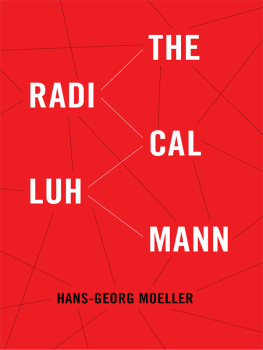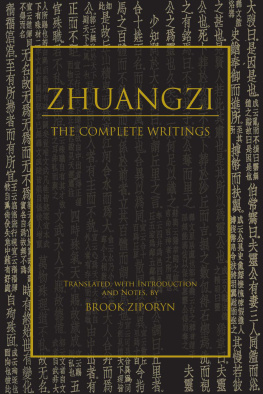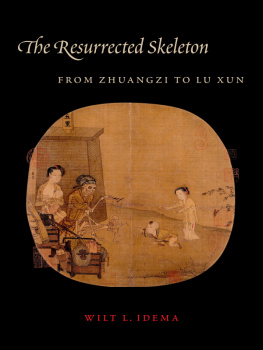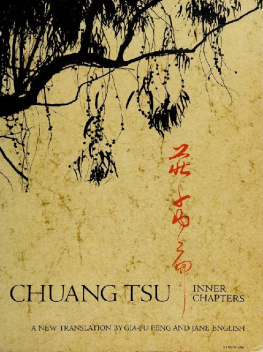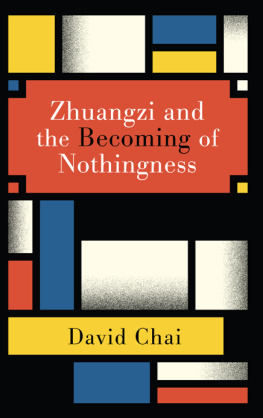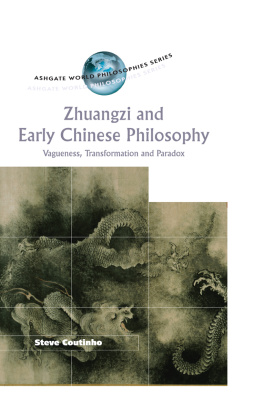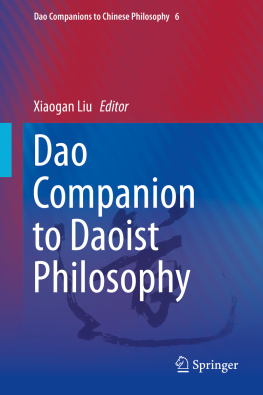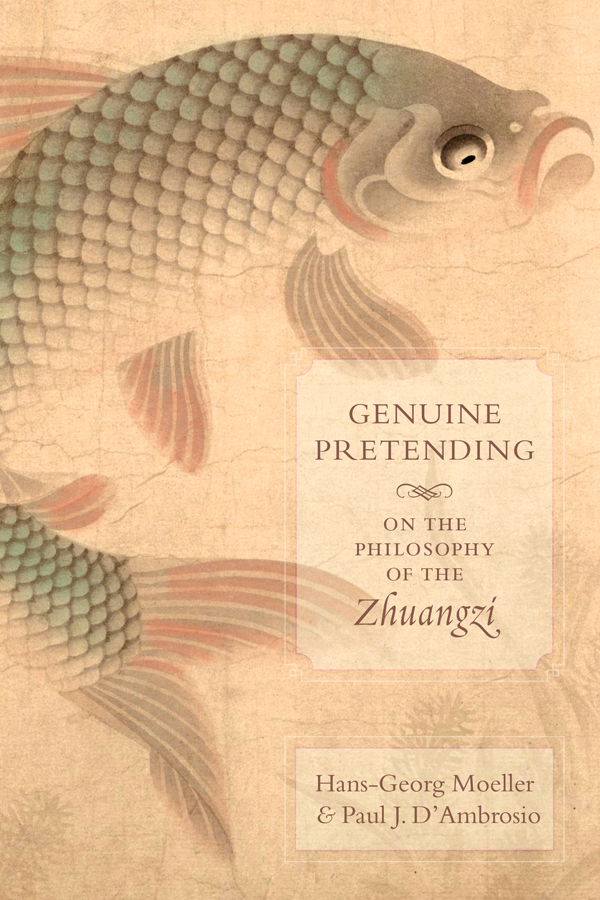Contents
Guide
Pagebreaks of the print version
GENUINE PRETENDING
HANS-GEORG MOELLER & PAUL J. DAMBROSIO
GENUINE PRETENDING
ON THE PHILOSOPHY OF THE ZHUANGZI
COLUMBIA UNIVERSITY PRESS New York

Columbia University Press
Publishers Since 1893
New York Chichester, West Sussex
cup.columbia.edu
Copyright 2017 Columbia University Press
All rights reserved
E-ISBN 978-0-231-54526-6
Library of Congress Cataloging-in-Publication Data
Names: Moeller, Hans-Georg, 1964 author. | DAmbrosio, Paul J., author.
Title: Genuine pretending : on the philosophy of the Zhuangzi / Hans-Georg Moeller and Paul J. DAmbrosio.
Description: New York : Columbia University Press, 2017. | Includes bibliographical references and index.
Identifiers: LCCN 2017003660 | ISBN 9780231183987 (cloth : alk. paper) | ISBN 9780231183994 (pbk. : alk. paper)
Subjects: LCSH: Zhuangzi. Nanhua jing.
Classification: LCC BL1900.C576 M64 2017 | DDC 181/.114dc23
LC record available at https://lccn.loc.gov/2017003660
A Columbia University Press E-book.
CUP would be pleased to hear about your reading experience with this e-book at .
Cover design: Lisa Hamm
Cover image: Creative Commons
CONTENTS
Chen Guying
The Zhuangzi is one of my most beloved texts. It is an abundantly rich resource for reflecting on nature, the human world, and spirituality. History has given us many different interpretations of the Zhuangzi , and yet its philosophy can never be exhaustively explicated. With todays convergence of cultures and increasing communication among world traditions, it is natural that scholars from around the world should come to esteem this great book of Daoism.
I have known Hans-Georg Moeller for a long time and appreciate his work on the Laozi . I am delighted to find him working on another Daoist text. I have come to know his student Paul DAmbrosio as well, with whom I have had many pleasurable exchanges on Nietzsche, Zhuangzi, and other philosophers. Their work on genuine pretending is an inspired new take on the Zhuangzi and engages in comparative philosophy on the highest level.
Scholars today need to be steeped in the philosophy, language, culture, and history of more than one tradition in order to make significant contributions in philosophy. Genuine pretending is a perfect example of how cross-cultural philosophy can develop valuable new perspectives on the history of philosophy, society, and human spirituality. It shows how Zhuangzis freedom occurs at the core of our daily lives, and how it is accessible even in its most mundane aspects.
Truly, Zhuangzis writing is characterized by humor. Scholars have often noted this fact, but few have undertaken serious philosophical investigations into the implications of it. The reflections on humor developed in this work bring to light important aspects of Zhuangzis teachings.
I am delighted to invite readers to join on this path of reading the Zhuangzi !
In this book, we attempt a reading of Daoist philosophy that departs from more common spiritual or metaphysical frameworks. We approach the Zhuangzi as a sometimes biting and provocative sociopolitical critique of its times and reflect on its often comical expression of a subversive existential mode that allows one to better endure or even to thrive in adverse circumstances. For us, this text, among other things, advises against the common human tendency to develop an inflated ego in reaction to successor to lose confidence in response to failure. The socially induced identity one adopts may turn out to be an ominous chimera. For the sake of maintaining sanity, the Zhuangzi undermines rigid beliefs, judgments, preferences, and dislikes by fostering a humorous attitude toward the world and, in particular, toward oneself.
When we arrived at the idea for this book, we first imagined it as both a study of the Zhuangzi and an outline of a New Daoist philosophy. Eventually, we decided to rein in our ambitions and focus on the first goal only, saving the second endeavor for another occasion. Still, we hope that a sympathetic reader may be able to infer a trajectory toward a potential New Daoism from the gist of our interpretations.
We would like to express our deepest gratitude to the eminent New Daoist philosopher Chen Guyinga role model for usfor contributing the foreword to this book. We are indebted to Seth Crownover and Mike Ashby for editing the text and correcting many mistakes and to Christian Schwermann for providing much-appreciated sinological and otherwise knowledgeable input. We pay due respect to Brook Ziporyn for inspiring much of our understanding of Daoism, and we are grateful for the advice on genuine pretending, as well as general comments, to Sarah Flavel, John and Mary Jo Maraldo, Michael Nylan, Julia Jansen, Henry Rosemont Jr., Rolf Trauzettel, Andrew Whitehead, Trenton Wilson, Yang Guorong, and Ellen Zhang. We thank Robert Carleo for inventing the term zhen uineness, Robin Wang for living and sharing her own version of being a New Daoist, and Hans-Rudolf Kantor for nothing in particular. We wish to thank Wendy Lochner at Columbia University Press for her support, and we extend our gratitude for permission to use some revised excerpts from our other publications to Roger Ames ( Philosophy East and West ), the University of Hawaii Press, Huang Yong and Springer ( Dao ), and Livia Kohn (Three Pines Press). As is academically customary, we accept full responsibility for any errors and shortcomings of this work and assign all the blame for them to the respective other of the two of us.
Da es mir zum Beispiel niemals zum Bewutsein gekommen ist, wieviel Gesichter es giebt. Es giebt eine Menge Menschen, aber noch viel mehr Gesichter, denn jeder hat mehrere. Da sind Leute, die tragen ein Gesicht jahrelang, natrlich nutzt es sich ab, es wird schmutzig, es bricht in den Falten, es weitet sich aus wie Handschuhe, die man auf der Reise getragen hat. Das sind sparsame, einfache Leute; sie wechseln es nicht, sie lassen es nicht einmal reinigen. Es sei gut genug, behaupten sie, und wer kann ihnen das Gegenteil nachweisen? Nun fragt es sich freilich, da sie mehrere Gesichter haben, was tun sie mit den andern? Sie heben sie auf. Ihre Kinder sollen sie tragen. Aber es kommt auch vor, da ihre Hunde damit ausgehen. Weshalb auch nicht? Gesicht ist Gesicht.
(To think, for example, that I have never consciously registered just how many faces there are. There are a great many people, but there are a great many more faces, for every person has several. There are people who wear the same face for years on end; naturally, it shows signs of wear, it gets dirty, it cracks at the creases, it splays out like gloves worn on a journey. These are simple people, practising economies, and they do not change their faces or even have it cleaned. Itll do fine, they insist, and who is to prove them wrong? The question, of course, since they have several faces, is what they do with the others? They keep them for best: their children can wear them some day. But it has been known for their dogs to go out wearing them, too. And why not? A face is a face.)
Rainer Maria Rilke, Die Aufzeichnungen des Malte Laurids Brigge ( The Notebooks of Malte Laurids Brigge )
Genuine pretending, the notion introduced in this book for the purpose of representing our take on the philosophy of the Zhuangzi , is not an altogether new idea. It connects with the wild card metaphor employed by Brook Ziporyn in his concise and subtle account Zhuangzi as Philosopher (2015). What distinguishes our approach from Ziporyns is perhaps best summarized by saying that, rather than as a wild card in the general sense, we see the genuine pretender more specifically as a joker card .


